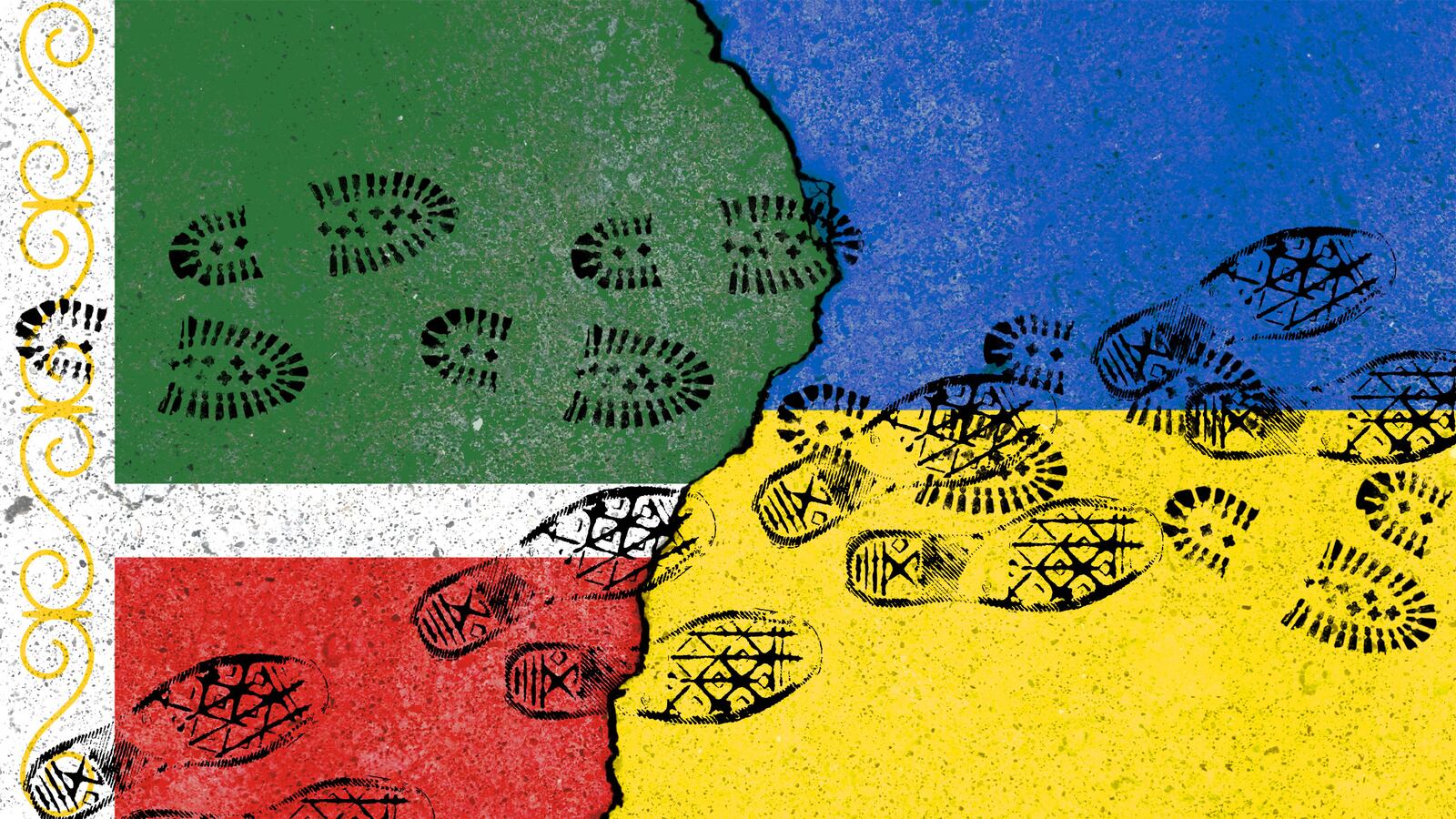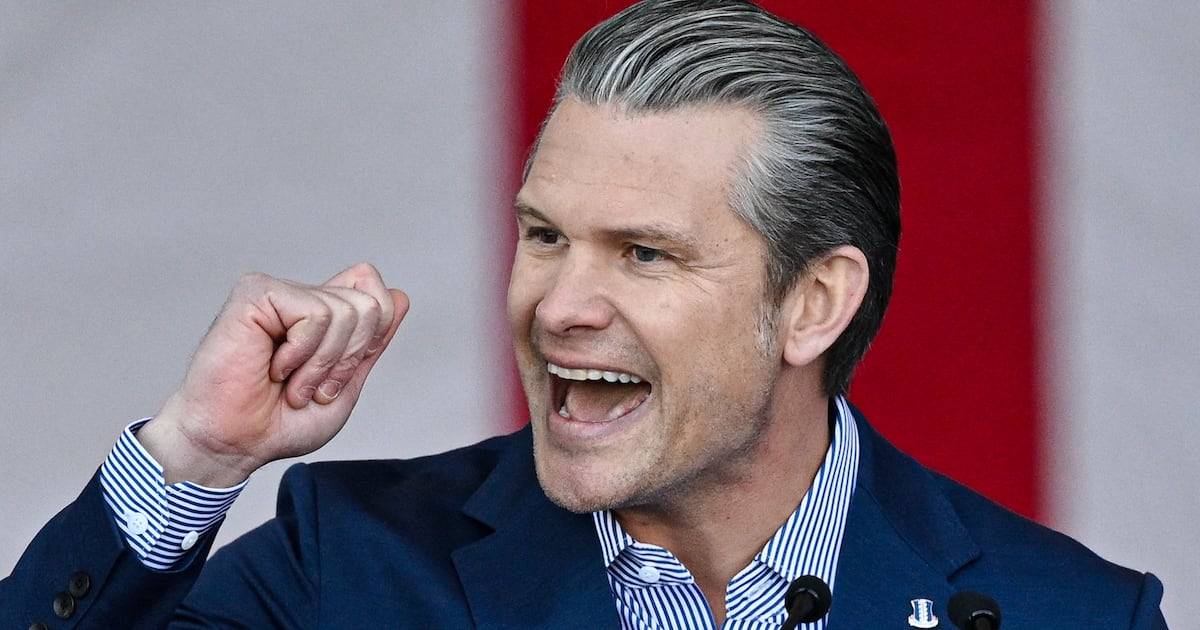KIEV—Anna Moliar, an outspoken Ukrainian attorney, has watched with growing concern reports about the criminality of Chechen gangs and militia recruits in her country, which already is torn by the ongoing war with pro-Russian militants in the east and south.
“It seems anybody can travel across the eastern border controlled by separatists, sneak in, and commit a crime in Ukraine,” Moliar told The Daily Beast.
But the situation is complicated by the fact that some Chechens in Ukraine are just refugees, some are just criminals, some are terrorists, and some have been embraced as freedom fighters because they’re fighting the Russians and their proxies, too. In fact, some Chechens fit all those categories.
Almost every week Moliar, a prominent independent criminologist, appears on Kiev’s local television channels taking note of the alarming numbers of car bombings, criminal investigations of assassinations, and police special operations. And she is not alone.
Moliar tells The Daily Beast that Ukraine’s criminal situation is growing worse than anywhere in Europe, and that many Chechen nationals from Russia are based in the port city of Odessa, which is far from the war front.
“Ukraine has become a very comfortable place for those wanted in Russia for terrorism,” she noted, not least because “Chechens can speak Russian here.”
Last Saturday, the deputy head of the National Police of Ukraine, Viacheslav Abroskin, posted several photographs of detainees at the moment of arrest.
“I have nothing against Chechen people, but their criminal representatives coming to our country to commit a crime will be seen only in the following poses,” Abroskin wrote after a special operation in the southern region of Ukraine. Some of the suspects were spread-eagled, some were face-down on the ground.
But even a crackdown can have dangerous consequences.
“If Ukraine puts pressure on the Chechen militants, there will be a danger of terrorist attacks,” said Gregory Shvedov, editor-in-chief of the internet news agency Caucasian Knot and a prominent human rights defender.
Already, amid the widespread unrest in Ukraine, one has a sense of a war within a war that involves Muslim Chechen fighters committed to jihad against Moscow, Muslim Chechen agents dispatched by Ramzan Kadyrov, who is Moscow’s man in the Chechen homeland, and other operatives as well.
In the last two to three years Kadyrov has been hunting down what he’s described as his “personal enemies” in the Chechen community in nearby Turkey. Many came here.
“We recently conducted a report about Chechens fleeing from Turkey, where it’s becoming dangerous for them, to Ukraine, where it is hard for them to obtain a legal status,” Shvedov told The Daily Beast. “Since most of them cannot be employed officially, their source of income is unclear.”
Making war is in some case the preferred way to make a living.
Radio Liberty recently came out with a report under the headline: “Ukraine: The Second Front of the Chechen War.”
Earlier this month a Toyota was bombed right outside of Kiev’s popular Besarabsky Market, adding one more victim to the list of assassinations in the Ukrainian capital: Timur Makhauri, a Chechen-born member of a Ukrainian volunteer battalion who had been arrested briefly in Ukraine for illegal possession of weapons.
Earlier Makhauri spent three years, from 2012 to 2015, behind bars in Turkey for the murder of a Chechen Islamist rebel from the so-called Caucasus Emirate, a group defined as a terrorist organization both by Russia and the United States. Jihadists from the group claimed responsibility for organizing violent attacks and killing hundreds of civilians in many regions of Russia.
Some in Ukraine believed that Makhauri was a Russian spy, others that he was a friend of Kiev.
Video watched hundreds of thousands of times on YouTube showed random people helping the wounded passengers, including a terrified, wounded little girl and her mother, who had lost a part of her leg in the explosion.
A week later, investigators still had not made it clear whether the bombing in the center of Kiev was a terrorist attack.
“There are several versions: the assassination could have been ordered by Russian special services—or by somebody here who wanted Makhauri dead,” Moliar told The Daily Beast.
Makhauri was one of 100 volunteer soldiers fighting in eastern Ukraine, including veteran Chechen militants with more than two decades of experience in combat against Russia in the wars for Chechen independence; some of them were devoted jihadists, others more recent recruits to the so-called Islamic State who had become disillusioned with the war in the Middle East.
The war has cost thousands of lives on the battlefield, and even without the Chechen elements there are constant fears of terror attacks behind the lines, whether by the Chechen fighters or, just as often, targeting them.
A fire and then enormous explosions at an arms depot in central Ukraine on Tuesday night only heightened these fears. Authorities blamed “sabotage,” and some 30,000 people had to be evacuated.
Chechen commanders taking part in Ukraine’s fight against Russian-backed forces say they share a common enemy with the Ukrainian military, so cooperation is natural.
“Our goal is to see the Russian empire fall apart; we are now about 100 people, but, if needed, more than 1,000 Chechens can come to Ukraine from Europe,” said Adam Osmayev, the commander of another Chechen battalion, and a particularly interesting figure.
Osmayev and his wife, Amina Akuyeva, are both wanted in Russia for terrorism: Osmayev for organizing assassination attempts on Chechen leader Ramzan Kadyrov—and on Russian President Vladimir Putin—and Okuyeva for being a long-time supporter of the terrorist underground in Chechnya.
Osmayev has denied his participation in any of the attempts on Kadyrov and Putin.
Today, both Osmayev and Akuyeva are devoted fighters in what they describe as “the war of Chechen liberation,” and true supporters of what Kiev calls its Anti-terrorist Operation in Donbas, the east of the country where the Russian-supported insurgents have declared independent “republics.”
In June, Akuyeva and Osmayev survived a deadly attack in Kiev, which they say they believe was an assassination attempt ordered either by Russian special services or by Chechen leader Ramzan Kadyrov.
For many Russians, whatever they may think about the war in Ukraine, there is very little sympathy with the Chechens who claim allegiance to the jihadist group called the Caucasus Emirate.
Russia suffered from terrorism for many years, and the violence is not easily forgotten. On September 1, 2004, there were 1,128 people—mothers, fathers, grandparents and children—were taken hostage inside School #1 of Beslan, a town in the North Caucasus; 32 terrorists were holding them for three days without food, without water, in a terribly hot gym stuffed with explosives.
On the third day of the Beslan crisis the death toll reached 333. Dozens of children died that day, leaving the town heartbroken for generations to come.
The attackers were mostly members of the Chechen Islamist underground. Their leader Shamil Basayev claimed responsibility for the hostage crisis.
Earlier this month the Ukrainian State Border service detained eight armed men from Chechnya and Dagestan in Chernobayevka, Kherson region, situated more than 300 miles south from Kiev.
The report on the government’s website said that the detainees had foreign passports, carried hand grenades, Glock and Makarov pistols, AK-74 assault rifles, sniper rifles, explosives, military uniforms, balaclavas and night vision equipment. The report also mentioned that the detained men “were acting under the cover of a patriotic group” and that they had come to Ukraine illegally.
Were they criminals? Were they terrorists? Were they freedom fighters? In such cases the distinctions are increasingly hard to draw.






